| Sanda Wuduroma of Borno | |
|---|---|
| Reign | 1894 |
| Predecessor | Kyari of Borno |
| Successor | Sanda Kura |
| Died | 1894 Wuduro, Konduga, Borno |
| Dynasty | Kanemi |
| Father | Bukar Kura |
| Religion | Muslim |
Sanda Wuduroma, or Abu Sanda bin Buqar al-Kanemi, (?-1894) was Shehu of Borno in 1894.
At the death of his brother and predecessor Shehu Kyari, Sanda Wuduroma (also known as Abba Sanda Limannambe) became Shehu of Borno in 1893 when the country was invaded by Rabih az-Zubayr. His reign was short-lived as he was captured and killed by one of Rabih's soldiers called Gadum in 1894. His name Wuduroma comes from the place of his assassination, Wuduro. [1] [2]
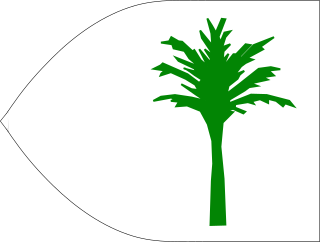
The Kanem–Bornu Empire existed in areas which are now part of Nigeria, Niger, Cameroon, Libya and Chad. It was known to the Arabian geographers as the Kanem Empire from the 8th century AD onward and lasted as the independent kingdom of Bornu until 1900.
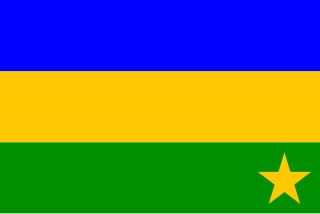
The Kanuri people are an African ethnic group living largely in the lands of the former Kanem and Bornu Empires in Niger, Nigeria, Chad, and Cameroon. As well as a diaspora community residing in Sudan. Those generally termed Kanuri include several subgroups and dialect groups, some of whom identify as distinct from the Kanuri. Most trace their origins to ruling lineages of the medieval Kanem-Bornu Empire, and its client states or provinces. In contrast to the neighboring Toubou or Zaghawa pastoralists, Kanuri groups have traditionally been sedentary, engaging in farming, fishing the Chad Basin, trade, and salt processing.
Ngazargamu, Birni Ngazargamu, Birnin Gazargamu, Gazargamo or N'gazargamu, was the capital of the Bornu Empire from ca. 1460 to 1809. Situated 150 km (93 mi) west of Lake Chad in the Yobe State of modern Nigeria, the remains of the former capital city are still visible. The surrounding wall is 6.6 km (4.1 mi) long and in parts it is still up to 5 m (16 ft) high.

Borno State is a state in the North-East geopolitical zone of Nigeria, bordered by Yobe to the west for about 421 km, Gombe to the southwest for 93 km, and Adamawa to the south while its eastern border forms part of the national border with Cameroon for about 426 km, its northern border forms part of the national border with Niger, for about 223 km mostly across the Komadougou-Yobe River, and its northeastern border forms all of the national border with Chad for 85 km, being the only Nigerian state to border three foreign countries. It takes its name from the historic emirate of Borno, with the emirate's old capital of Maiduguri serving as the capital city of Borno State. The state was formed in 1976 when the former North-Eastern State was broken up. It originally included the area that is now Yobe State, which became a distinct state in 1991.
Kukawa, formerly Kuka ("Baobab"), is a town and Local Government Area in the northeastern Nigerian state of Borno, close to Lake Chad.

Rabih az-Zubayr ibn Fadl Allah or Rabih Fadlallah, usually known as Rabah in French, was a Sudanese warlord and slave trader who established a powerful empire east of Lake Chad, in today's Chad.
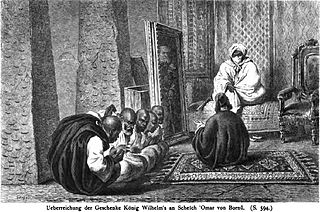
Umar I ibn Muhammad al-Amin or Umar of Borno was Shehu (Sheik) of the Kanem-Bornu Empire and son of Muhammad al-Amin al-Kanemi.

Shehu Muhammad al-Amîn ibn Muhammad al-Kanemi (1776–1837) was an Islamic scholar, teacher, religious and political leader who advised and eventually supplanted the Sayfawa dynasty of the Kanem–Bornu Empire. In 1846, al-Kanemi's son Umar I ibn Muhammad al-Amin became the sole ruler of Borno, an event which marked the end of the Sayfawa dynasty's eight hundred year rule. The current Shehu of Bornu, a traditional ruler whose seat remains in modern Borno State, Nigeria, is descended from al-Kanemi.
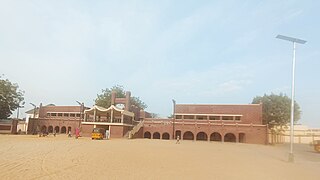
The Borno Emirate or Sultanate, sometimes known as the Bornu Emirate, is a traditional Nigerian state that was formed at the start of the 20th century. It is headed by the descendants of the rulers of the Bornu Empire, founded before 1000. The rulers have the title Shehu of Borno. The traditional emirate of Borno maintains a ceremonial rule of the Kanuri people, based in Maiduguri, Borno State, Nigeria, but acknowledged by the 4 million Kanuri in neighbouring countries.

Abu Bakr bin Ibrahim al-Kanemi CBE, was the Shehu of Bornu from 1902 to 1922.
The Dikwa Emirate is one of the successor states to the old Bornu Empire, a traditional state within Borno State, Nigeria. It was established in 1901 at the start of the colonial period after the Bornu empire had been partitioned between the British, French and Germans.
'Abd ar-Rahman, Abdurrahman or Darman was Shehu of Borno from 1853 to 1854.
Bukar or Bukar Kura bin Umar al-Kanemi was Shehu of Borno from 1881 to c. 1884.
Ibrahim or Ibrahim bin Umar al-Kanemi was Shehu of Borno from c. 1884 to c. 1885.
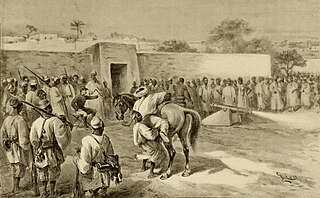
Ashimi or Hashim bin Umar al-Kanemi (1840s-1893) was Shehu of Borno from ca.1885 to 1893.
Kyari or Khair bin Bukhar al-Kanemi (?-1894) was Shehu of Borno in 1893–1894.

Shehu Umar Sanda ibn Ibrahim Kura al-Kanemi was the Shehu of Borno from 1922 to 1937. He was the son of Shehu Ibrahim Kura of Borno and brother of Shehu Abubakar Garbai.

Shehu Umar Ibn Muhammad also known as Shehu Sanda Kyarimi, CBE, CMG, KBE, was Shehu of Dikwa between 1922 and 1937 and Shehu of Borno from 1937 to 1967.
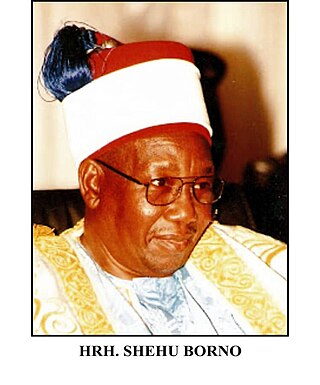
Abubakar Ibn Umar Garba Al Amin El-Kanemi Shehu Of Borno is the Shehu, or traditional ruler, of the Borno Emirate in northeast Nigeria.
Shehu Hayatu ibn Sa'id, also known as Hayatu Balda, was a 19th-century Islamic scholar and the leading Mahdist leader in the Central Sudan region. He was the great-grandson of Usman dan Fodio, the leader of the Sokoto jihad and first caliph of Sokoto. Hayatu left Sokoto in the late 1870s to settle in Adamawa, the emirate on the easternmost end of the caliphate. In 1883, he was appointed as the deputy of the Sudanese Mahdi, Muhammad Ahmad, and was tasked with leading a jihad over the Sokoto Caliphate. Despite several attempts by Lamido Zubeiru of Adamawa to persuade Hayatu to abandon his Mahdist cause, conflict ensued resulting in a disastrous defeat for Zubeiru's forces in 1893. This victory bolstered Hayatu's following and influence, leading to an alliance with Rabih az-Zubayr, a Sudanese warlord and Mahdist sympathiser. Together, they conquered the weakened Bornu Empire in 1893, aiming eventually to conquer the Sokoto Caliphate. Hayatu served as the Imam of Rabih's Bornu, acting as its spiritual leader. However, the alliance eventually fractured, and Hayatu was killed during an attempted escape from Bornu in 1898.